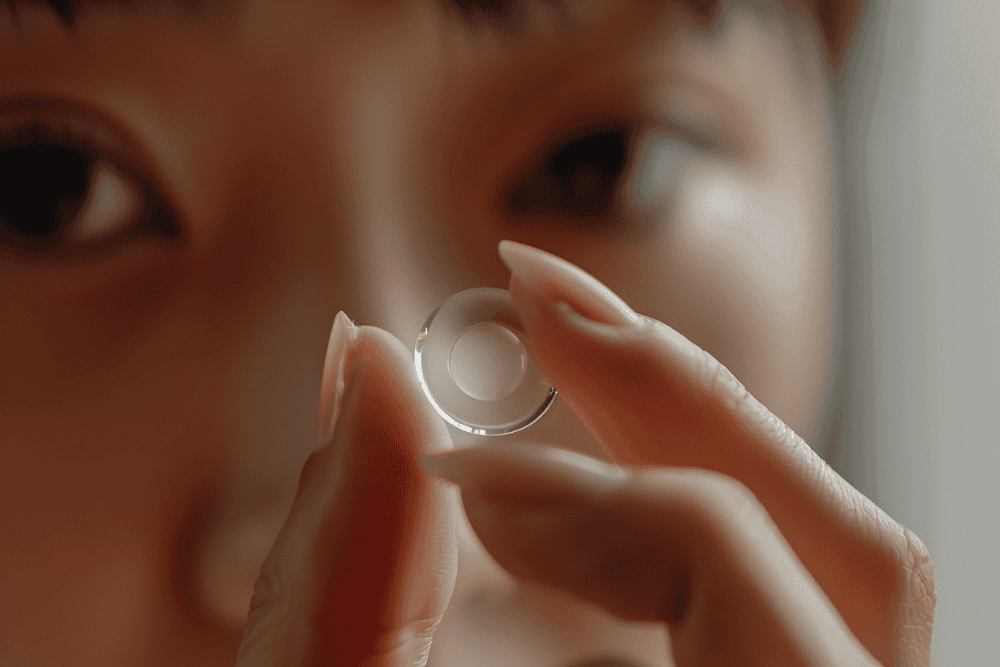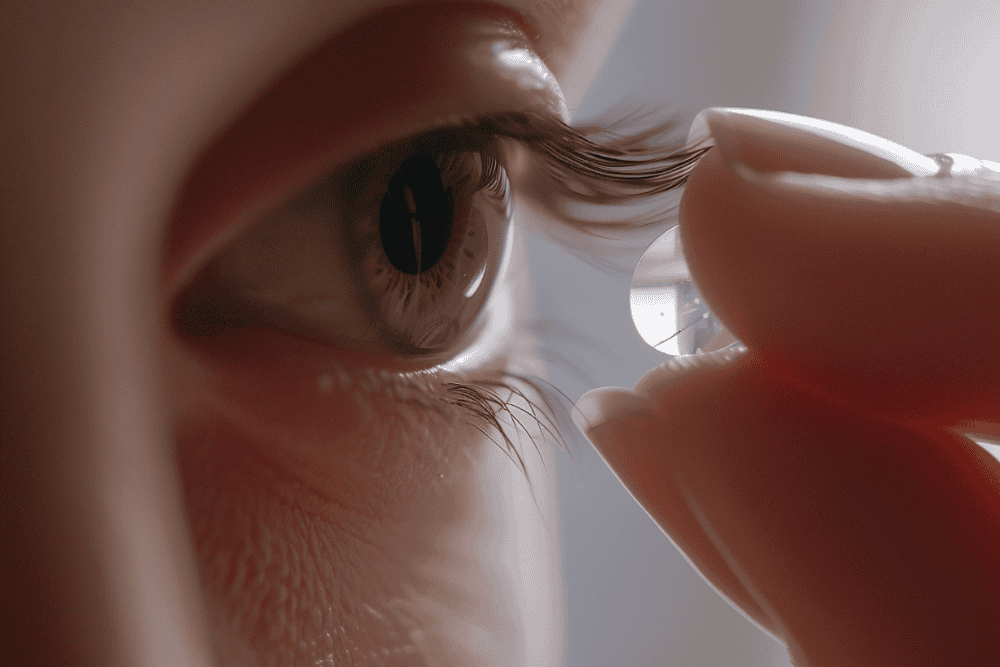Understanding Ortho-K Lenses and Associated Costs
Ortho-K, also referred to as corneal refractive therapy, is a non-surgical vision correction method, offers an alternative to glasses and laser surgery.
What Are Ortho-K Lenses?
Ortho-K lenses, or orthokeratology lenses, involve the use of specially designed gas permeable contact lenses.

Ortho K Lenses are Gas Permeable which Helps to Keep Your Eyes More Comfortable
Unlike traditional contact lenses that you wear during the day to help you see better, Ortho-K lenses are different. Unlike a contact lens, you actually wear them overnight – not to see better – but to reshape the cornea. This vision shaping treatment process corrects myopia (nearsightedness) temporarily, allowing you to see clearly during the day without the need for glasses or contacts.
Benefits of Ortho-K Over Glasses
Unlike glasses, Ortho-K gives you freedom from visual aids during the day – generally with minimal or no side effects.
This benefit suits active lifestyles or sports where glasses can prove inconvenient. Additionally, Ortho-K lenses slow myopia progression in children, a significant advantage over traditional glasses.
Ortho-K vs. Laser Eye Surgery
Ortho-K offers a reversible, surgery-free option for vision correction, contrasting with procedures like LASIK or PRK, that permanently modify the cornea.
While laser surgery provides a long-term solution, Ortho-K allows for adjustments in prescription changes and lacks surgical risks. The reshaping of the cornea is temporary with Ortho K.
Medical Considerations and Suitability
Before considering Ortho-K lenses, you should review several medical factors to determine if this treatment aligns with your eye health needs.
Who Is a Candidate for Ortho-K?
Ortho-K benefits individuals with moderate myopia who seek a temporary alternative to glasses or daytime contacts.
Your optometrist conducts a detailed eye exam to verify your suitability. Your corneal health and vision needs guide their recommendation.
Here at our office in Fair Lawn, NJ, our optometrist Dr. Knapp can conduct a comprehensive eye exam to determine whether or not Ortho-K might be a good fit for you. We’re easily accessible to prospective patients in Northern New Jersey and the New York City metro area. If you’re in the area, contact us to set up an appointment.

Ortho K Lenses are Frequently Used to Treat Myopia
Myopia and Ortho-K Eligibility
Your eligibility for Ortho-K hinges on the degree of myopia or nearsightedness.
Those with a mild to moderate refractive error often qualify.
If you have presbyopia or hyperopia, Ortho-K might not be the best fit.
Children with progressing myopia are ideal candidates as Ortho-K can help control its advancement.
Long-Term Considerations for Ortho-K Treatment
Getting Ortho-K lenses isn’t a one and done process. It requires continual assessment with an eye care specialist is crucial to monitor the progress of your vision with Ortho-K.
Treatment does not stop the natural change in your eyes that age brings, such as presbyopia, and adjustments in prescription may be necessary over time.
Cost Factors for Ortho-K Lenses
When you consider investing in Ortho-K lenses, you assess various cost factors. These lenses are not a one-size-fits-all solution, and their prices reflect this.
Your final cost hinges on multiple aspects, from the lens design to the care they require.
Initial Exam and Fitting
- Comprehensive Eye Exam: Before you begin treatment, you need a thorough eye exam to ensure you’re a suitable candidate.
- Corneal Topography: This imaging technique maps your cornea’s shape and is vital for designing your lenses. Fitting Ortho-K lenses takes skill. You pay for the expertise and time of the professional conducting the fitting.
The Lenses Themselves
- Custom Design: Ortho-K lenses are tailor-made for your eyes, impacting the price. The more severe your refractive error, the more you may have to pay. Custom lenses designed for unique eye shapes and prescriptions add to the cost.
- Material: The high-quality, breathable material of the lenses contributes to the cost.
Follow-Up Care
- Regular Appointments: You attend multiple follow-up visits to monitor your eye health and treatment progress.
Lens Care and Replacement
- Cleaning Solutions: You require specific cleaning solutions for lens maintenance.
- Lens Life: Depending on wear and tear, you’ll need to replace the lenses periodically.
Possible Additional Costs
- Insurance: Coverage varies, so you might have out-of-pocket expenses.
- Adjustments: Your lenses might need tweaks for optimal fit and function.
Comparative Cost Analysis: Ortho-K vs. Contact Lenses and Glasses
When you compare the costs of Ortho-K lenses to regular contact lenses and glasses, initial expenses stand out.
Ortho K cost typically ranges from $1,500 to $3,000 and this cost can rise as high as $5,000 for complex cases. This fee often covers the exam, fitting, lenses, and follow-ups.
In contrast, traditional contact lenses have lower initial costs but incur regular expenses. A daily contact lens will typically set you back just under $100/mo – or around $1,000/year.
Bi-weekly lenses might cost around $300-$400 per year, adding up to around $1,200 over three years. More frequent replacements or specialized lenses increase your cost.
Glasses offer a one-time expense, ranging from as low as $100 up to $1,000, depending on design and lens enhancements.
You may replace them due to changes in prescription or style preference but typically not as often as contact lenses.
Here’s a brief cost breakdown of an orthokeratology lens versus contact lens cost – along with the cost of glasses.
|
Item |
Initial Cost |
Annual Upkeep |
3-Year Cost |
|---|---|---|---|
Ortho K |
$2,000 – $4,000 |
$300 – $500 |
$1,900 – $5,500 |
|
Contacts |
$100 – $300 |
$100 – $300 |
$300 – $900 |
|
Glasses |
$100 – $600 |
$0 |
$100 – $600 |
Health Insurance Coverage for Ortho-K
When you explore coverage for Ortho-K lenses, it’s important to check your insurance plan carefully.
Some plans see Ortho-K as an elective procedure and may not cover it. However, if deemed medically necessary, you could receive partial or full coverage. Insurers assess need on a case-by-case basis.
To understand your coverage, contact your insurer directly.
Ask specific questions about Ortho-K under your current policy.
Clarify whether you qualify for insurance benefits and confirm any out-of-pocket costs you might incur.
Here’s what you typically need to verify:
- Type of plan: Determine if your policy categorizes Ortho-K as a standard benefit.
- Medical necessity: Some insurers cover Ortho-K for specific conditions.
- Coverage extent: Identify if your plan offers full or only partial reimbursement.
- Out-of-pocket costs: Check for deductibles, copays, or other expenses.
Remember, Ortho-K costs can vary broadly, commonly ranging from $2,000 to $4,000.
Your final cost may depend on the complexity of your eye condition and follow-up care needed.
Stay informed about potential annual expenses such as replacement lenses and lens care, which can add $300 to $500 yearly.
Average Cost of Ortho-K Lenses with Insurance Coverage
Taking a deeper look at insurance costs, here’s what you can expect. Insurance coverage varies greatly between different providers and plans. Some policies may cover Ortho-K as a necessary vision correction method, while others might view them as elective, leaving you with higher out-of-pocket expenses.
Expected Costs with Insurance
- Partial Coverage: If your plan offers partial coverage, you might pay a portion of the initial cost, which includes the eye exam, fitting, and lenses.
- Full Coverage: Plans that consider Ortho-K medically necessary may cover the entire expense. Still, this is less common.
|
Insurance Type |
Coverage |
Your Cost |
|---|---|---|
|
Partial |
Exams & Fittings |
$500 – $2,000 |
|
Full |
Entire Cost |
$0 – Minimal |
Remember to check with your insurance provider to confirm the exact coverage details.
Prices can differ based on the level of refractive error and the complexity of your prescription.
Ask Your Optometrist’s Office to Check Your Insurance Coverage
After an eye examination with your eye doctor to determine if Ortho K is right for you, you can inquire about insurance coverage. Note that your optometry office should have eye care professionals on staff that can contact your insurance company on your behalf to figure out exactly how much your insurance company will cover towards the cost of Ortho-K lenses. If you’re in the Northern NJ / NYC area, go ahead and call us to determine exactly how much your insurance covers.
Out-of-Pocket Costs
Even with insurance, anticipate additional yearly costs for lens replacement, care solutions, and follow-up exams.
Expect to budget an extra $300 to $500 annually, not typically included in the insurance coverage.
They can give specific details on coverage for Ortho-K lenses and any deductibles or copays that apply to your situation.
Paying for Ortho-K Treatment When Insurance Doesn’t Cover Everything
Financing
We’ve discussed insurance and how it may be able to help you to cover your costs. If you don’t have applicable health insurance, or if you need additional financing in addition to what your insurance covers, you may wish to consider financing.
Financing options like CareCredit may offer manageable payment plans to help you cover the cost of Ortho-K. Some optometry offices even allow you to spread payments over several months.
Note that our optometry office in Fair Lawn accepts CareCredit Financing.
Financial Assistance and Payment Plans for Ortho-K
Some eye care providers may offer income-based discount programs. These options could reduce the total cost significantly. Check with your provider to see if they participate in such programs.
Health Savings Accounts (HSAs) / Flexible Spending Accounts (FSAs)
Candidates for Ortho-K may also consider using pre-tax dollars from your HSA or FSA for Ortho-K costs if your plan allows it.
Additional Costs for Ortho-K Lenses for Adults Compared to Children
When considering Ortho-K lenses, adults often face higher costs than children due to the complexity of their prescriptions.
For adults, advanced myopia or presbyopia can require more customized lenses. These may range between $2,000 to $4,000.
Complex prescriptions can lead to increased prices due to more intensive fitting procedures and possibly more frequent follow-ups.
For children, Ortho-K lenses not only correct vision but also aim to slow myopia progression.
The initial cost for these lenses in children might be lower as their prescriptions are often less complicated. However, children’s eyes grow and change rapidly, which may require updated lenses and additional follow-up exams more often than adults need them.
It’s important for you to consider ongoing costs that apply to both adults and children:
- Replacement lenses
- Lens care solutions
- Regular follow-up exams
For example, lens replacements and care essentials can total $300 to $500 annually.
Keep in mind that insurance plans vary and might cover a portion of these costs.
Beside initial expenses, plan your budget for the long-term financial commitment required to maintain Ortho-K lenses, whether you’re evaluating options for yourself or for your child.
Purchasing Ortho-K Lenses Online
When you opt for Ortho-K lenses online, you face a range of prices.
Costs differ based on your prescription needs and lens designs.
Generally, online retailers offer lenses from $2,000 to $4,000 upfront.
Other Ortho K Information
With Ortho K, there are other things to think about. As with many medical treatments an Ortho K patients may experience some side effects. See our article about Common Side Effects from Ortho K Treatment which includes conditions like dry eye, blurred vision, and eye discomfort.




